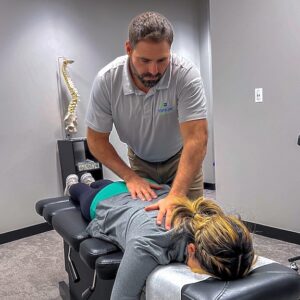Chiropractors are considered doctors because they earn a Doctor of Chiropractic (DC) degree, complete thousands of hours of advanced training, and are licensed to diagnose and treat patients. They are not medical doctors (MDs), but they are real doctors in their field, specializing in noninvasive, drug-free care for spine, joint, and nervous system conditions.
Why Do People Ask if Chiropractors Are Doctors?
The question comes up often because the public typically associates the word “doctor” only with medical doctors. Adding to the confusion, chiropractors don’t prescribe medication or perform surgery, which makes some wonder if they’re doctors. This misunderstanding fuels the common misconception that chiropractors are not real doctors.
To clear things up, it helps to compare chiropractic physicians with other types of doctors. An MD (Doctor of Medicine) and a DO (Doctor of Osteopathy) are medical doctors, while a D.C. is a doctor of chiropractic. Each requires years of doctoral-level education, licensing exams, and ongoing professional training. The difference lies in their focus and scope of practice, not in whether they have earned the title of doctor.
What Does “Doctor” Mean?
In health care, “doctor” is a title that applies to anyone who has earned a doctoral-level degree in their profession. It’s not exclusive to medicine.
- Dentists (DDS or DMD)
- Optometrists (OD)
- Psychologists (PhD or PsyD)
- Podiatrists (DPM)
- Chiropractors (DC)
While these providers differ in focus, the title reflects advanced clinical expertise. Chiropractors doctors fit within this framework. They are trained specialists in musculoskeletal and nervous system health. The degree is different from medical school, but the education is just as real and rigorous.
Chiropractors’ Education and Training
Becoming a chiropractor requires a Doctor of Chiropractic degree from an accredited chiropractic college. Admission requires at least three years of undergraduate study in biology, chemistry, anatomy and other sciences. Most applicants complete a bachelor’s degree before entering chiropractic school.
Chiropractic education includes more than 4,200 hours of classroom, laboratory and clinical training. Coursework covers anatomy, physiology, neurology, radiology, nutrition, biomechanics and chiropractic techniques such as spinal manipulation. Students also spend significant time in supervised internships, learning to perform chiropractic adjustments, read diagnostic imaging and manage patient care.
Compared to medical school, chiropractic school focuses less on pharmacology and surgery and more on biomechanics, the nervous system and hands-on, noninvasive care. Both tracks are doctoral-level programs with demanding clinical requirements, but the emphasis differs.
Licensure and Professional Standards
Like medical doctors, chiropractors must be licensed to practice. After earning a DC, graduates must pass a series of examinations from the National Board of Chiropractic Examiners (NBCE). These exams test knowledge of basic sciences, clinical reasoning, diagnostic imaging and hands-on chiropractic techniques.
Each chiropractor must also apply for state licensure, which can include additional exams covering local laws and professional standards. Once licensed, chiropractors are required to complete continuing education to stay current with evolving research, technology and chiropractic therapy methods.
In the United States, chiropractic examiners in each state oversee these requirements, ensuring that chiropractors maintain safe and effective standards of care.
Scope of Practice vs. Medical Doctors
The main differences between chiropractic physicians and medical doctors lie in their scope of practice:
- Chiropractors: Focus on the spine, joints, and nervous system. They use chiropractic adjustments, spinal manipulation, traction and rehabilitation exercises to restore mobility and relieve pain. They do not prescribe medication or perform surgery.
- Medical doctors: Can prescribe drugs, perform surgical procedures and manage a wider range of systemic conditions. Their training prepares them for hospital-based and pharmacological interventions.
Rather than competing, the two roles complement each other. Chiropractors offer conservative care that often reduces the need for invasive treatment. Medical doctors handle conditions that require prescriptions or surgery. Patients benefit most when both work together, blending chiropractic care with traditional medical care.
The Role of Chiropractors in Modern Healthcare
Chiropractors are increasingly integrated into today’s healthcare system. They are recognized as primary contact providers, meaning patients can visit them directly without a referral from a primary care physician. This makes chiropractic therapy a first step for people dealing with back pain, neck pain, or posture-related issues.
Medical doctors are also more likely today to refer patients to chiropractors for pain management, particularly when conservative care is appropriate. Research shows that spinal manipulation and chiropractic adjustments are effective for conditions such as low back pain, headaches and sciatica, making chiropractic treatment an evidence-based option.
Beyond symptom relief, chiropractors contribute to preventative care and overall wellness. By improving spinal alignment and nervous system function, they help patients avoid recurring pain and maintain healthier lifestyles.
Common Myths About Chiropractors
Despite their growing role in healthcare, misconceptions persist:
- Myth: Chiropractors don’t go to school long enough.
Fact: Chiropractors complete more than 4,200 hours of doctoral-level training, plus national board exams and state licensure. - Myth: Chiropractic isn’t science-based.
Fact: Chiropractic care is grounded in anatomy, biomechanics, neurology and clinical research. Adjustments and chiropractic techniques are supported by evidence, with organizations such as the American College of Physicians recommending spinal manipulation for back pain. - Myth: Chiropractors only treat back pain.
Fact: Chiropractors also treat headaches, posture problems, joint mobility issues and conditions like sciatica, carpal tunnel syndrome and sports injuries.
So, are chiropractors considered doctors? Yes. Chiropractors hold doctoral degrees, complete rigorous training, pass national board exams and maintain state licensure. They are not medical doctors, but they are recognized healthcare providers specializing in musculoskeletal and nervous system care.
Personalized Chiropractic Care Across Northern Illinois
At Evolve Chiropractic, we take this role further through corrective care. Instead of only masking symptoms, they identify and treat underlying causes, combining chiropractic adjustments with rehabilitation exercises, traction and advanced therapies. This approach creates lasting relief and better function for patients across Northern Illinois.
Evolve Chiropractic is also unique in its reach and consistency of care. With more than 20 locations throughout Northern Illinois, patients have convenient access to highly trained chiropractors who specialize in spine health, headache relief and solutions for neck and back pain, numbness, tingling and muscle tension. Every office is equipped with state-of-the-art technology, and each doctor is committed to evidence-based care designed to achieve long-term relief without medication or invasive procedures.
What sets us apart from many other practices is its corrective care model. Traditional chiropractic care often stops at pain relief, but Evolve Chiropractic goes deeper by identifying and correcting the true source of dysfunction. By addressing the underlying issue, patients not only feel better in the short term but are also less likely to experience recurring pain in the future. This proactive approach helps patients achieve stability, strength and whole-body wellness.
Evolve offers comprehensive services that include spinal examinations, X-rays, orthopedic testing, biomechanical and functional assessments, chiropractic adjustments, spinal traction and customized rehabilitation exercises. This wide range of services ensures patients receive care tailored to their specific condition. Beyond acute injuries, Evolve chiropractors treat spinal stenosis, carpal tunnel syndrome, degenerative disc disease, tennis elbow, plantar fasciitis, headaches, migraines, sciatica and herniated discs.
If you are considering whether chiropractic care is right for you, explore the benefits of chiropractic care and schedule an appointment with Evolve. With expert doctors, modern techniques and a corrective care philosophy, Evolve delivers safe, effective care for your spine and overall health.





